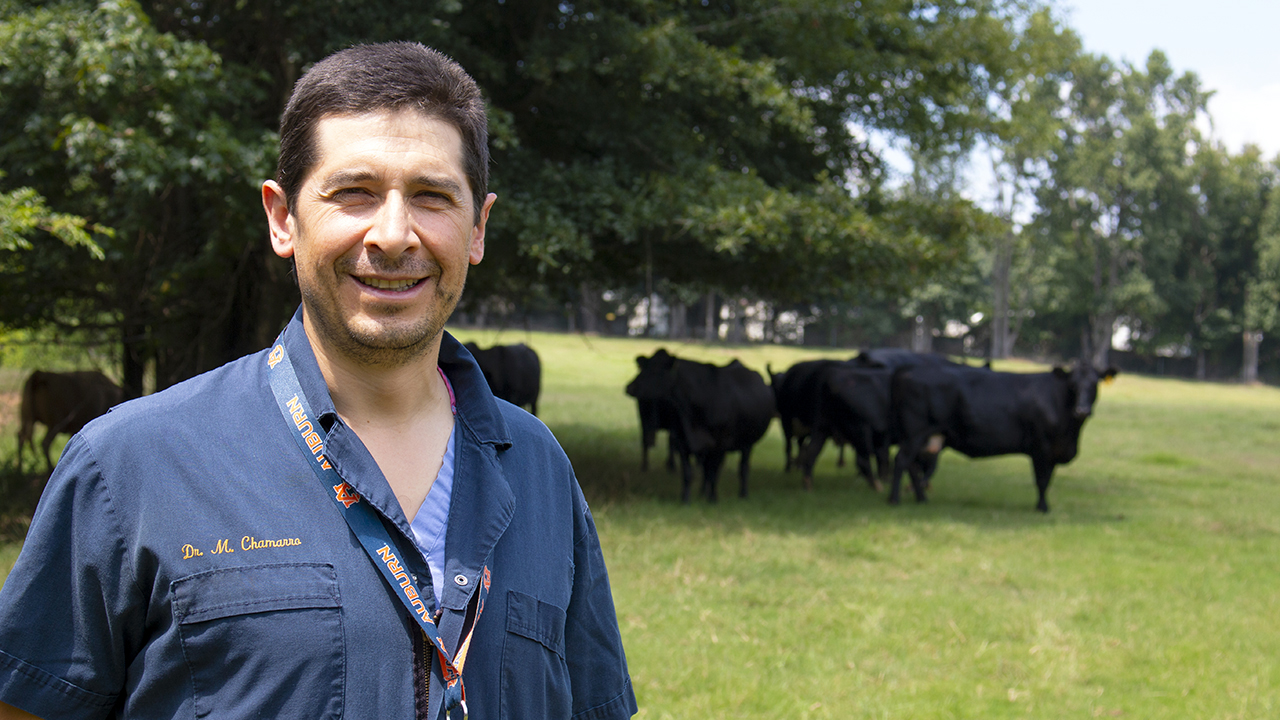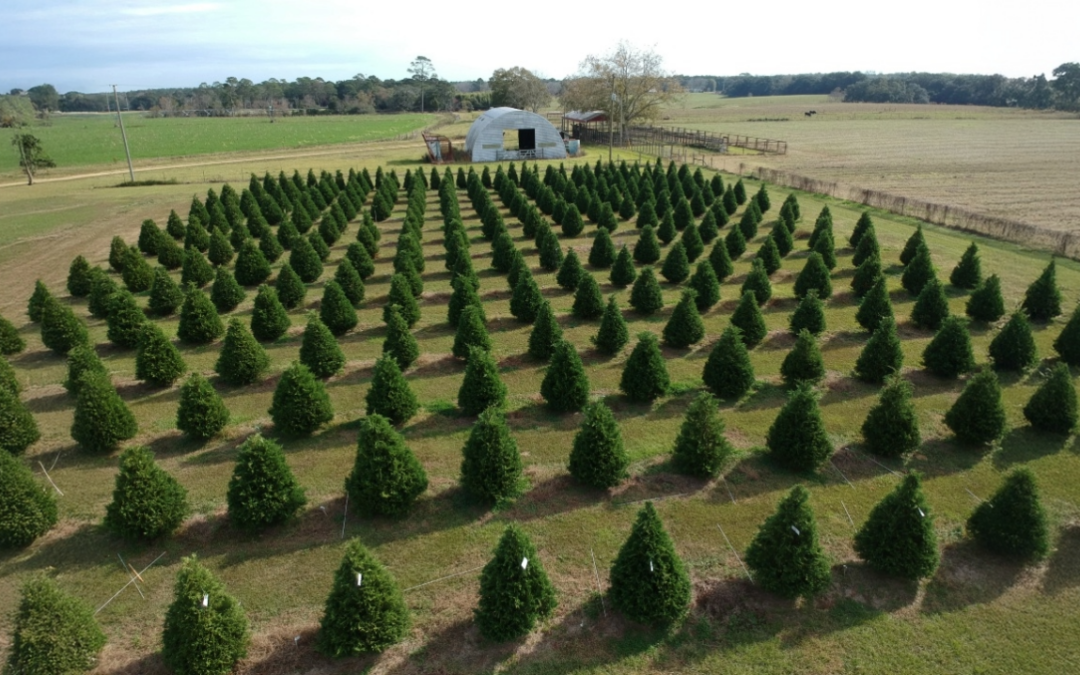By Paul Hollis / Jul 29, 2019 1:53:18 PM
Feature
As agricultural research dollars become increasingly scarce, it’s more important than ever that funded projects provide timely solutions to real-world problems.
That’s why the proposals approved for Auburn University’s Production Agriculture Research, or PAR, grants program must undergo a rigorous review before being approved.
“The main goal of the program is to support research that will provide immediate solutions to stakeholder identified problems in Alabama,” said Henry Fadamiro, associate dean for research for the College of Agriculture and associate director of the Alabama Agricultural Experiment Station.
Research proposals from faculty are reviewed in an intensive process involving stakeholders and scientists.
“The first stage is a relevance review panel, including representatives from the Alabama Farmers Federation and the Alabama Cattlemen’s Association,” Fadamiro said. “We ask them to rate the relevance of the proposals from high to no relevance.”
This is followed by a technical review, where a panel of experts in the various fields of research rate the scientific merits of the proposals. In other words, they determine whether or not, if funded, the proposal likely will be successful.
Six proposals made the final cut this year, with a total funding for all projects of $285,000. Since the program was begun in 2017, more than $1.3 million has been awarded to 30 projects.
The grants are administered through the AAES with USDA National Institute of Food and Agriculture Hatch funding and matching state appropriations. Many of the two-year, $50,000 PAR grants support combined research and extension projects to address current farming problems in a timely manner through applied research.
“The stakeholders are very happy with the process, and we’re now beginning to see significant outcomes from the initial PAR grants that were awarded two years ago,” Fadamiro said.
Playing an active role in the grants review process is the Alabama Farmers Federation, the state’s largest farm organization.
“We see great potential in the PAR grant concept developed by the College of Agriculture and the Alabama Agricultural Experiment Station,” said Brian Hardin, director of governmental and agricultural programs for the federation.
The program, Hardin said, allows for direct stakeholder feedback to research that is most significant to farmers and landowners in the state.
“We see our relationship with the college and the AAES as critical,” he said. “This is another way that we work together to help farmers and benefit agriculture in our state. The PAR program provides a way to communicate those needs so the most impactful research is funded.”
Another active stakeholder is the Alabama Cattlemen’s Association, representing a $2.5 billion industry.
“The AAES Production Agriculture Research awards have direct impacts for Alabama producers,” said Erin Beasley, executive vice president of the association and a member of the grant review panel.
“The projects have a focus for on-farm issues and practical solutions to provide farmers answers to questions affecting their bottom line,” she said. “I was pleased to see two beef cattle projects awarded this year addressing forage and animal health problems that will improve the cattle industry in Alabama.”
One beef cattle-related PAR initiative this year will be used to help fight the leading cause of death in nursing beef calves older than three weeks of age.
Bovine respiratory syncytial virus, or BRSV, is a common cause of severe respiratory disease in young calves. The condition costs the nation’s cow-calf industry an estimated $165 million annually.
The research proposed will evaluate two different approaches to prevent BRSV infection in nursing beef calves, said AAES researcher Manuel F. Chamorro, assistant professor of food animal medicine and surgery in the College of Veterinary Medicine.
“The objective of this research is to develop a vaccination protocol that will reduce morbidity and mortality of nursing beef calves affected by BRSV in cow-calf beef operations,” Chamorro said. “We’ll accomplish this by developing an effective vaccination protocol that will reduce BRSV-associated disease in beef calves before and after weaning.”
Additionally, researchers expect to change current strategies of vaccinating pregnant beef cows and newborn calves to reduce the incidence of viral respiratory disease in nursing calves.
PAR grants have proven ideal for stimulating research funding for new crops, such as kiwifruit, a specialty crop that primarily serves overseas markets. In recent years, kiwifruit has emerged as a potential high-value crop in the Southeast, particularly in central Alabama.
“Despite being classified as an insect pollinator-dependent crop, no information about kiwifruit’s pollination requirements exists in the United States,” said Geoff Williams, Auburn assistant professor of entomology and apiology. “Therefore, producers lack a science-based pollination management strategy. This dearth in knowledge results in inefficient use of resources and/or poor crop yield, and ultimately restricts growth of the industry.”
To address this problem, Williams and his colleagues will be using funds from a 2019 PAR grant to study the pollination requirements of two important female kiwifruit cultivars grown in Alabama.
“Specifically, we plan to evaluate their common insect visitors, determine pollen transfer efficiencies of their common insect visitors and assess the efficiency of existing pollination methods, including wind, insect, hand, pollen duster,” he said.
“We will use a combination of insect survey/collection, flower exclusion and fruit quality assessment methods to accomplish this in the field and laboratory. We will communicate our results in person at stakeholder meetings and in a webinar, and via text through an extension bulletin, blog and scientific publication.”
By identifying and communicating pollination requirements of this high-value specialty crop, kiwifruit growers will be directly influenced on how to manage their orchards in Alabama and in the rest of the U.S., he said. This will promote adoption of kiwifruit farming through improved crop yields and profitability.
The titles of and lead investigators on the four remaining projects that received 2019 PAR grants follow.
· Characterization and alleviation of harvest and transport-induced stress in hybrid catfish: Joe Tomasso, director and professor, School of Fisheries, Aquaculture and Aquatic Sciences.
· Nutrigenomics approach to dampen the negative effects of endophyte-infected tall fescue on beef cow-calf performance: Sonia Moisa, assistant professor, Department of Animal Sciences.
· An integrated, multiscale study of Chinese tallowtree invasion—developing solutions to mitigate impacts on native ecosystems in Alabama Coastal Areas; Zhaofei Fan, associate professor, School of Forestry and Wildlife Sciences.
· Comparison of traditional selection with DNA biotechnologies to enhance disease resistance in catfish: Rex Dunham, professor, School of Fisheries, Aquaculture and Aquatic Sciences.





